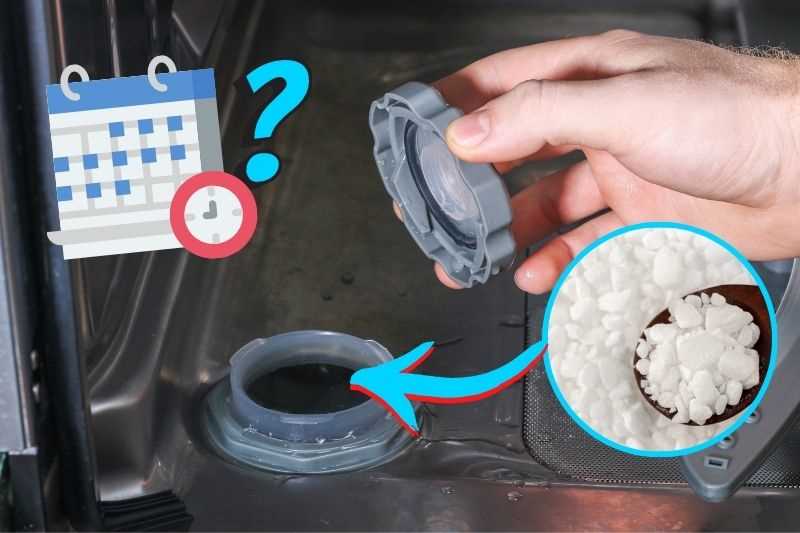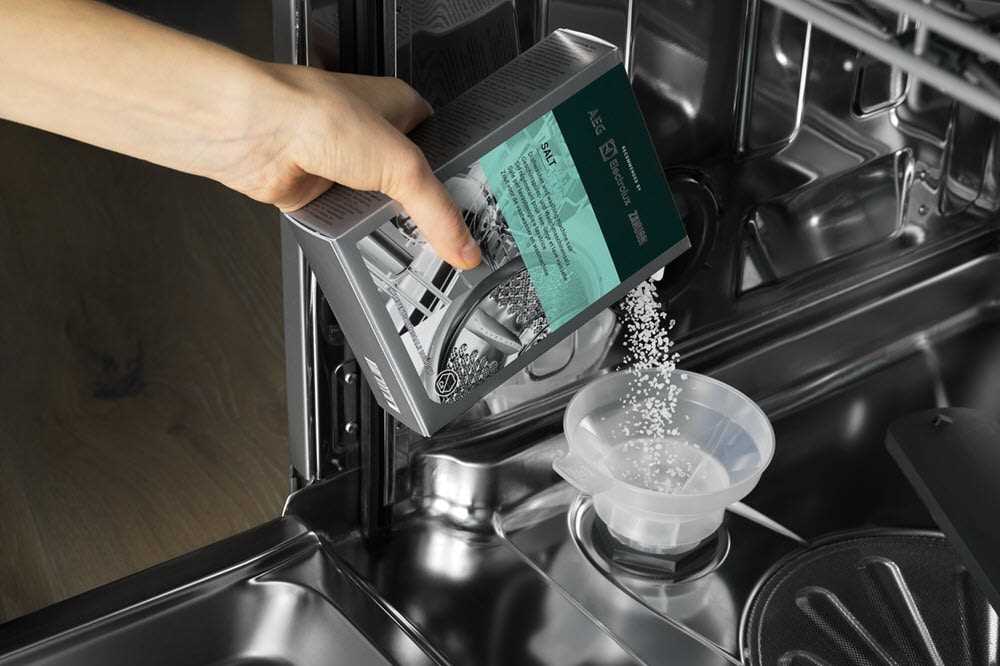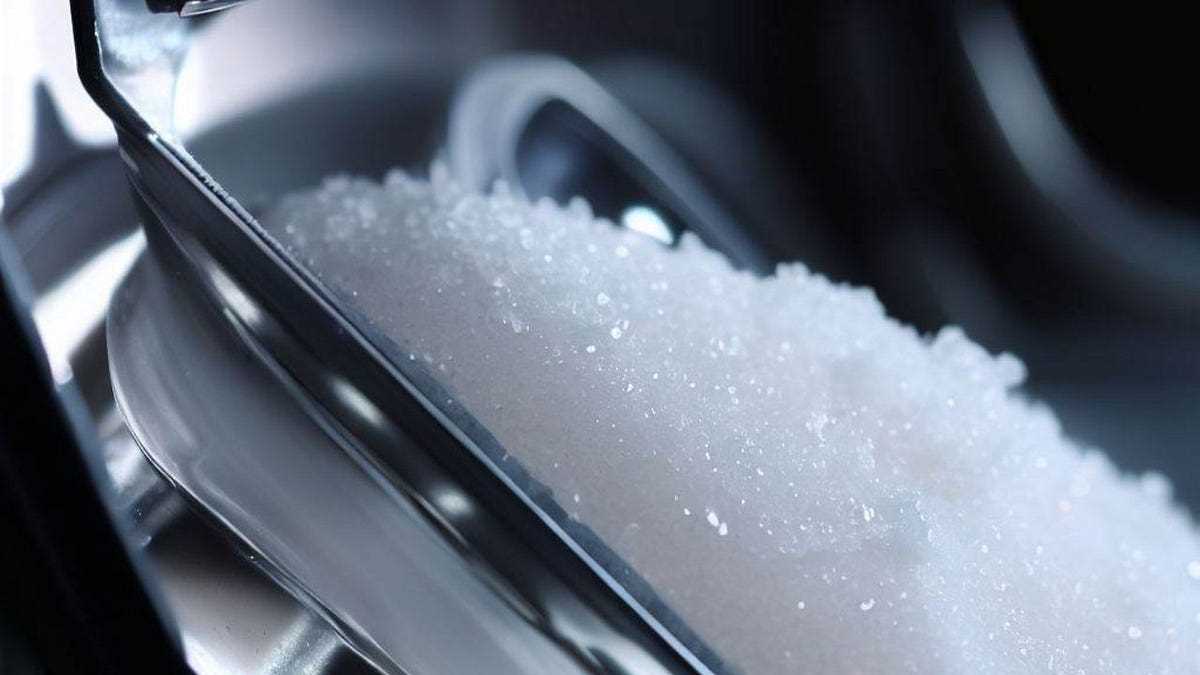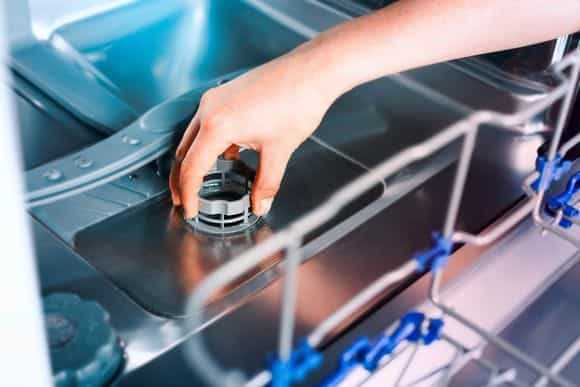




When it comes to dishwasher maintenance, many people often overlook the importance of adding salt to the machine. But adding the right amount of salt can make a world of difference in the performance and lifespan of your dishwasher. If you’ve ever wondered how much salt to add and why it’s necessary, this guide is for you.
The primary reason for adding salt to your dishwasher is to help soften the water. Hard water, which is high in mineral content, can leave behind spots, residue, and limescale on your dishes and glasses. By adding salt, you can reduce the impact of hard water and ensure that your dishes come out clean and shiny every time.
So, how much salt should you add? The answer can vary depending on the hardness level of your water. Most dishwashers have a salt reservoir that needs to be filled with salt every 2 to 3 months. To determine the right amount of salt, consult your dishwasher’s manual or use an online calculator. It’s crucial not to overfill the reservoir, as this could lead to over-softening of the water and potentially damage your dishwasher.
One mistake to avoid is forgetting to add salt to your dishwasher again after refilling the reservoir. It’s easy to lose track of the last time you added salt, especially if your dishwasher’s salt refill indicator is not functioning properly. To keep track, you can mark a reminder on your calendar or set an alarm on your phone to ensure that you maintain the right amount of salt in your dishwasher at all times.
Another consideration is the type of salt to use. Not all salts are created equal, and using the wrong type of salt can negatively impact the performance of your dishwasher. It’s best to use high-quality dishwasher salts that are specifically designed for dishwashers. Avoid using table salts or any other additives, as they may contain ingredients that could damage your dishwasher or leave behind residue on your dishes.
In conclusion, adding the right amount of salt to your dishwasher is crucial for optimal performance and to extend the lifespan of your machine. By monitoring the hardness level of your water, using the correct type of salt, and following your dishwasher’s manual, you can ensure that your dishes come out clean and spotless every time. So, don’t forget to give your dishwasher some love and attention – it will reward you with sparkling clean dishes and glasses.
How Much Salt to Add to Your Dishwasher
Adding salt to your dishwasher is an important step in ensuring that your dishes come out clean and spotless. However, it’s crucial to know how much salt to add so that you don’t end up overfilling the salt reservoir and causing damage to your appliance.
How Much Salt is Enough?
The amount of salt you should add to your dishwasher depends on the hardness of your water. If you live in an area with soft water, you may not need to add any salt at all. On the other hand, if your water is very hard, you may need to add more salt. The best way to determine the right amount of salt is to consult your dishwasher’s manual or contact the manufacturer for guidance.
Adjusting the Salt Level
To adjust the salt level in your dishwasher, you’ll first need to locate the salt reservoir. This is usually located near the bottom of the dishwasher, inside the door. Once you’ve found the reservoir, you can adjust the salt level by turning the cap or lid on the reservoir. Be sure to use caution and follow the manufacturer’s instructions to avoid any damage to your dishwasher.
Frequently Asked Questions
If you still have questions about adding salt to your dishwasher, here are some common ones:
- Q: How often do I need to add salt to my dishwasher?
- A: The frequency of adding salt will depend on how often you run your dishwasher and the hardness of your water. It’s best to check the salt level regularly and add more if needed.
- Q: What will happen if I forget to add salt?
- A: Forgetting to add salt may result in dishes not being cleaned properly, and they could come out with spots or residue.
- Q: Can I use table salt instead of dishwasher salt?
- A: It’s recommended to use dishwasher salt as table salt may contain additives that can impact the performance of your dishwasher.
- Q: How many cycles will a 4 kg bag of dishwasher salt last?
- A: A 4 kg bag of dishwasher salt can last for around 40 cycles, depending on the amount of salt needed per cycle.
In Conclusion
Adding salt to your dishwasher is an essential step to ensure clean and spotless dishes. Be sure to consult your dishwasher’s manual or contact the manufacturer for guidance on how much salt to add. Use caution when adjusting the salt level and regularly check the salt reservoir to ensure optimal performance of your dishwasher.
The Ultimate Guide to Salt Usage
When it comes to salt usage, there are several factors to consider, including the type of dishwasher you have, the hardness level of your water, and the specific needs of your dishes. In this guide, we will explore the different ways you can use salt in your dishwasher, the optimal amount to use, and the potential disadvantages of neglecting this important step.
Why Do You Need to Use Salt in Your Dishwasher?
Adding salt to your dishwasher helps to ensure that your dishes are cleaned properly. It helps to soften the water and prevent limescale build-up, which can affect the performance of your dishwasher and the cleanliness of your dishes.
How Much Salt Should You Add?
The amount of salt you should add to your dishwasher depends on the hardness level of your water. You can use a water hardness calculator to determine the optimal amount for your specific situation. In general, the salt reservoir in your dishwasher can typically hold around 1 kg of salt, which should last for several months.
Three Ways to Add Salt to Your Dishwasher
- Using dishwasher salt tablets: These are pre-measured tablets that you can simply place in the salt reservoir. They are convenient and ensure that you are using the right amount of salt.
- Pouring salt into the salt reservoir: If you don’t have dishwasher salt tablets, you can pour salt directly into the reservoir. Be cautious and avoid accidentally pouring salt into other areas of the dishwasher.
- Adding salt through the dishwasher’s water inlet: Some dishwashers have a specific compartment where you can add salt. Refer to your dishwasher’s manual to locate this compartment.
Disadvantages of Not Using Salt
Neglecting to add salt to your dishwasher can lead to several disadvantages:
- Your dishes may not be washed as effectively and could have a salty taste.
- Limescale and mineral deposits can build up in your dishwasher, reducing its efficiency and potentially increasing maintenance costs.
- Hard water stains may be more difficult to remove from your dishes and dishwasher.
Other Uses for Salt

Salt can also be used for other cleaning purposes, such as cleaning your oven or removing stains from fabric. However, be sure to follow specific instructions for each use case, as the amount and method of application may vary.
In conclusion, using salt in your dishwasher is an essential step to ensure optimal cleaning and extend the lifespan of your appliance. By following the recommended salt levels and using the appropriate method for adding salt, you can enjoy sparkling clean dishes with every cycle.
How Much Salt for the Dishwasher
Adding salt to your dishwasher is an important step in ensuring optimal performance and clean dishes. Adjusting the salt in your dishwasher can make a significant difference in the quality of your dishwashing results. In this guide, we will discuss how much salt you should add to your dishwasher, why it’s important, and some tips and mistakes to avoid.
Why Do You Need Salt for Your Dishwasher?
Many dishwashers have a built-in water softener that uses salt to remove minerals and prevent limescale buildup. Limescale can damage your dishwasher and leave spots on your dishes. By adding salt, you can ensure that your dishwasher operates at its best and your dishes come out clean and spot-free.
How Much Salt Should You Add?
The amount of salt you need to add will depend on your specific dishwasher model and water hardness level in your area. To determine the right amount, check the manufacturer’s instructions or the sidebar of your dishwasher. Some dishwashers have a salt dosage calculator, which can help you determine the optimal amount of salt to add. Typically, you will need to fill a salt reservoir located at the bottom of your dishwasher.
How to Add Salt to Your Dishwasher
- Prepare the dishwasher: Make sure the dishwasher is empty and cleaned before adding salt. Wipe any spills or residue from the salt reservoir.
- Locate the salt reservoir: Depending on your dishwasher model, the salt reservoir may be on the bottom or in a separate compartment. Refer to the dishwasher manual if you’re unsure.
- Open the salt reservoir: Unscrew the cap or remove the cover to access the reservoir.
- Fill the salt reservoir: Pour the appropriate amount of salt into the reservoir. Be careful not to overfill or spill salt into other parts of the dishwasher.
- Close the salt reservoir: Screw the cap back on or put the cover back in place to seal the reservoir.
- Monitor salt usage: Check the salt reservoir periodically to ensure it doesn’t run out. Refill as needed.
Mistakes to Avoid
- Forgetting to add salt: If you neglect this step, your dishwasher may not perform as effectively.
- Underfilling or overfilling the salt reservoir: It’s important to add the right amount of salt. Underfilling can lead to limescale buildup, while overfilling can cause clogs or damage the dishwasher.
- Using the wrong type of salt: Only use dishwasher salt, as other types like table salt or sea salt may not dissolve properly or contain additives that could harm your dishwasher.
In conclusion, adding salt to your dishwasher is essential for optimal performance and clean dishes. By following the manufacturer’s instructions and using the appropriate amount, you can ensure that your dishwasher operates at its best and your dishes come out spotless every time.
For more tips and solutions for dealing with dishwasher-related issues, check out our other posts in the Kitchen section. Proper salt usage is just one of the many factors that contribute to a well-functioning dishwasher.
A Guide to Optimal Salt Usage
Using salt in your dishwasher is essential for achieving optimal cleaning results. Not using enough salt or using it incorrectly can lead to poor performance and unsatisfactory washing outcomes. In this guide, we will explore why you need salt in your dishwasher, how much salt to add, and common mistakes to avoid.
Why Do Dishwashers Need Salt?
Dishwashers use salt as a part of the water softening process. Hard water contains minerals like calcium and magnesium that can build up inside the dishwasher and affect its performance. The salt in the dishwasher helps to remove these minerals, preventing limescale buildup and ensuring that your dishes come out sparkling clean.
How Much Salt Should You Add?
The amount of salt you should add depends on the hardness of your water. If you live in an area with hard water, you will need to add more salt than if you have soft water. Ideally, you should consult your dishwasher’s user manual or use a water hardness calculator to determine the appropriate amount of salt to use.
As a general guideline, if your dishwasher has a separate salt dispenser, you will typically need to add around 1-3 kilograms of salt. This amount should last for several weeks or even months, depending on your dishwasher usage and water hardness.
Common Mistakes to Avoid
Here are some common mistakes that people make when using salt in their dishwashers:
- Underfilling the salt dispenser: If you add too little salt, it won’t be able to effectively soften the water. This can result in poor cleaning and limescale buildup inside the dishwasher.
- Using the wrong type of salt: Not all salt is suitable for use in dishwashers. Make sure to use dishwasher salt, which is specifically designed to eliminate minerals and prevent limescale.
- Forgetting to add salt: It’s easy to forget this step, especially if you’re running the dishwasher frequently. Using a salt monitoring device or setting a reminder can help you remember to add salt when needed.
- Accidentally closing the salt funnel: Some dishwashers have a salt funnel that needs to be closed after adding salt. Forgetting to close it can lead to water leakage and potential damage to the dishwasher.
- Overfilling the salt dispenser: Adding too much salt can cause excessive moisture inside the dishwasher. This can lead to condensation on the kitchen cabinets or even damage to the dishwasher itself.
Conclusion

Proper salt usage is crucial for maintaining the performance and longevity of your dishwasher. By following the recommended guidelines and avoiding common mistakes, you can ensure that your dishes are always washed to perfection. Remember to adjust the salt levels depending on your specific water hardness, and locate the salt dispenser inside your dishwasher for easy access. With the right amount of salt, your dishwasher will continue to provide you with sparkling clean dishes for years to come.
Why Adding Salt to Your Dishwasher is Important
Adding salt to your dishwasher is an important step in maintaining its optimal performance. Here are several reasons why you should have salt in your dishwasher:
- Helps to maintain optimal water hardness levels: Hard water can have a significant impact on the effectiveness of your dishwasher. By adding salt, you can reduce the hardness of the water and prevent the build-up of limescale.
- Improves the cleaning cycle: The salt helps to enhance the cleaning power of your dishwasher detergent, ensuring that your dishes come out sparkling clean every time.
- Extends the life of your dishwasher: By reducing the mineral build-up and limescale in your dishwasher, adding salt can help to prolong the life of your appliance, saving you money on costly repairs or replacement.
- Enhances the taste of your dishes: If you’ve ever noticed a metallic taste on your dishes, it could be due to hard water. Adding salt helps to soften the water, improving the taste of your dishes.
- Prevents clogging of dishwasher parts: Without salt, the reservoirs and other parts of your dishwasher can become clogged with limescale deposits. This can lead to reduced efficiency and the need for costly repairs.
How to Add Salt to Your Dishwasher
Adding salt to your dishwasher is a relatively simple process. Follow these steps:
- Ensure that the dishwasher is empty before pouring salt into the designated reservoir. Check your dishwasher’s manual to locate the salt reservoir, as it may vary depending on the model.
- If your salt reservoir has a screw-on cap, unscrew it and pour the salt into the reservoir. Make sure not to overfill it.
- If your dishwasher has a salt reservoir that uses a cap with a pouring aid, remove the cap and pour the salt in.
- Replace the cap tightly to avoid any salt leaks during the wash cycle.
It’s important to note that not all dishwashers require salt. Some models have built-in water softeners or operate effectively without salt. Check your dishwasher’s manual to determine if you need to add salt or not.
In summary, adding salt to your dishwasher is a crucial step in maintaining its performance and prolonging its life. By reducing water hardness, enhancing cleaning cycles, and preventing clogging, salt can have a positive impact on the overall effectiveness of your dishwasher. Make sure to follow the manufacturer’s guide and use a salt calculator to determine the amount of salt needed based on your water hardness. With salt, you can enjoy spotlessly clean and great-tasting dishes every time!
The Benefits of Salt in Dishwashing
Adding salt to your dishwasher can have several benefits. Here are some reasons why you should consider using salt for your dishwasher:
- Improves Cleaning Performance: Salt can help remove stubborn stains and stuck-on food from your dishes, leaving them cleaner and sparkling.
- Softens Water: Salt acts as a water softener by reducing the hardness of the water. Hard water can negatively affect the effectiveness of your dishwasher and leave mineral deposits on your dishes. By softening the water, salt ensures that your dishes are thoroughly cleaned.
- Prevents Spills and Overflows: Salt helps to secure the reservoirs inside your dishwasher, preventing any spills or overflows during the washing cycle. This ensures that the dishwasher functions properly without any mishaps.
- Enhances Dishwasher Lifespan: The use of salt can extend the lifespan of your dishwasher by preventing limescale buildup. Limescale can clog the dishwasher’s pipes and reduce its efficiency. Adding salt to your dishwasher helps to prevent limescale and keeps your dishwasher running smoothly.
- Improves Taste: When dishes are washed with salt, they have a fresher taste compared to when no salt is used. Salt can help to remove unwanted odors and improve the overall flavor of your dishes.
Now that you know the benefits of using salt in your dishwasher, here are some tips to keep in mind:
- Use the Right Amount: Follow the manufacturer’s instructions for the correct amount of salt to add. Underfilling or overfilling the reservoir can have negative effects on the cleaning performance of the dishwasher.
- Wipe any spills or excess salt: Be cautious and clean up any spills or excess salt that may have accidentally gotten inside the dishwasher. This will prevent any potential damage to the dishwasher.
- Use a Funnel: If using granulated salt, it’s best to use a funnel to ensure that the salt goes into the reservoir without any spills or mess.
- Run the Dishwasher on a Regular Basis: To prevent any salt buildup and ensure its effectiveness, run your dishwasher regularly.
- Adjusting Salt Usage: Depending on the hardness of your water, you may need to adjust the amount of salt you use. Using a water hardness test kit can help you determine the optimal salt level for your dishwasher.
By following these tips and using salt regularly in your dishwasher, you can enjoy the benefits of cleaner dishes, improved dishwasher performance, and enhanced taste. Don’t underestimate the impact that a little salt can have on your dishwashing routine!
Tips for Using Salt in Your Dishwasher
Using salt in your dishwasher is a primary step to ensure your dishes are washed and cleaned at their best. Here are some helpful tips for using salt in your dishwasher:
1. Locate the Salt Reservoir
Before you use salt in your dishwasher, you need to locate the salt reservoirs. Most dishwashers have a filled and level indicator showing how much salt you need to add.
2. The Amount of Salt
Depending on the hardness of your water, you will need to adjust the amount of salt you put in. A mistake frequently made is overfilling the salt reservoir. Use a salt calculator to know the optimal amount according to your water levels.
3. Adding Salt to Your Dishwasher

When adding salt to your dishwasher, make sure to wipe away any spills or residue. This will prevent clogging and keep your dishwasher running smoothly. Use a funnel to easily pour the salt into the reservoir.
4. Adjusting Salt Levels

If you find that your dishes are not being washed properly, it may be because the salt level in your dishwasher is too low. Adjusting the salt level can fix this issue and improve the cleaning results.
5. Remembering to Refill
It’s important to remember to refill the salt reservoir in your dishwasher. If you forget to refill it, your dishes may not come out as clean as they should be. Set a reminder or mark it in your calendar to ensure you don’t neglect this step.
6. The Disadvantages of Forgetting
If you consistently forget to refill the salt reservoir, hard water deposits can build up in your dishwasher. This can lead to damage and the need for costly repairs or even a replacement dishwasher.
7. Other Uses for Dishwasher Salt
Dishwasher salt is also useful for other household tasks. For example, it can be used to soften water in your laundry machine or to remove hard water stains in your kitchen or bathroom. Keep a separate bag of salt for these extension purposes.
By following these tips, you can maintain the optimal salt level in your dishwasher and ensure that your dishes come out sparkling clean every time.
FAQ
Why should I add salt to my dishwasher?
Adding salt to your dishwasher helps to soften the water, which in turn improves the cleaning efficiency of the dishwasher. It also helps to prevent limescale build-up on the dishwasher’s heating element, which can affect its performance.
How much salt should I add to my dishwasher?
The amount of salt you should add to your dishwasher depends on the hardness of your water. Check the manufacturer’s instructions for the specific amount recommended for your dishwasher model. As a general guide, you can start with adding around 1 kg (2.2 lbs) of salt and adjust it as needed.
Can I use table salt instead of dishwasher salt?
No, you should not use table salt in your dishwasher. Table salt contains additional additives, such as iodine and anti-caking agents, which can be harmful to your dishwasher. It is recommended to use dishwasher salt, which is specifically formulated for use in dishwashers.
When should I add salt to my dishwasher?
You should add salt to your dishwasher when the salt indicator light on the dishwasher’s control panel is lit. This usually indicates that the salt level is low and needs to be topped up. It is best to add salt before running a wash cycle.
Can I add too much salt to my dishwasher?
Adding too much salt to your dishwasher can cause water to become too soft, which can lead to poor cleaning results. It is important to follow the manufacturer’s instructions and only add the recommended amount of salt. If in doubt, you can check the water hardness level in your area and adjust the salt amount accordingly.
Is it necessary to add salt if I am using dishwasher tablets?
Yes, it is still necessary to add salt to your dishwasher even if you are using dishwasher tablets. The salt helps to soften the water, which improves the performance of the dishwasher and prevents limescale build-up. The tablets alone may not provide enough softening action, especially in areas with hard water.











